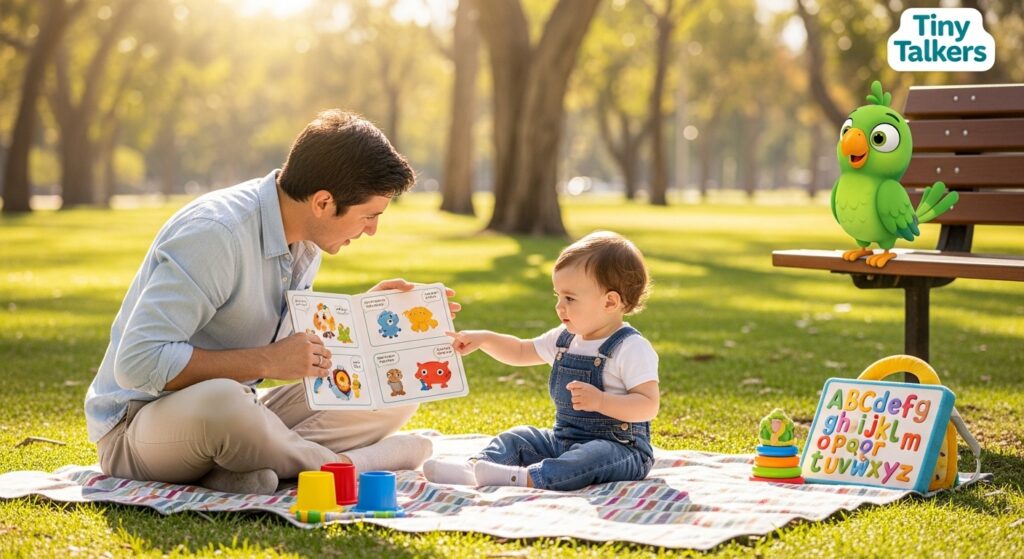As parents, watching your little one grow and develop is an exciting journey filled with surprises and milestones. One of the most fascinating aspects of this journey is witnessing your toddler’s communication skills evolve. While they may not have mastered the art of speaking in full sentences, it’s important to recognize that their understanding often surpasses their verbal abilities. Understanding this discrepancy can help you support their development more effectively. Here are some key indicators that your child comprehends more than they can articulate.
Understanding Gestures and Nonverbal Cues
Toddlers are incredibly perceptive when it comes to nonverbal communication. Even before they can speak fluently, they are keen observers of body language and gestures.
Responding to Simple Commands
If your toddler follows simple instructions like “bring me the ball” or “put the toy back,” it suggests they understand the language used, even if they can’t verbally respond. This indicates cognitive comprehension that precedes verbal expression.
Recognizing Familiar People and Objects
Does your toddler smile or wave when they see a familiar face or object? Recognition of people and objects is a strong indicator of understanding. They may not say “grandma” or “car,” but their enthusiastic response upon seeing these familiar entities shows they know exactly what or who they are.
Vocabulary Comprehension
While toddlers might struggle to pronounce words, they often comprehend far more than they can say. Their receptive language skills develop faster than their expressive language skills.
Following Multi-step Directions
If your child can follow a sequence of instructions, such as “pick up the toy and give it to daddy,” they’re demonstrating a keen understanding of language. This ability reflects not only comprehension but also memory and the ability to process information.
Understanding Context and Tone
Your toddler might not say much, but they often pick up on the context and tone of conversations. For instance, if you use a stern voice, they might stop what they’re doing, indicating they understand they should pay attention or change their behavior.
Emotional Awareness and Empathy
Toddlers are more emotionally intuitive than we often give them credit for. Emotional understanding is a complex cognitive skill that begins to develop early in life.
Responding to Others’ Emotions
If your toddler offers a hug when they see someone crying or laughs when others are laughing, they are showing signs of empathy. They might not verbalize, “Are you sad?” but their actions demonstrate an understanding of emotional cues.
Expressing Their Own Emotions
While they may not have the words to describe how they feel, toddlers often express emotions through actions. Tantrums, for example, might be their way of communicating frustration or tiredness. Recognizing these cues can help you understand their emotional state better.
Problem Solving and Critical Thinking
Problem-solving skills are a sign of understanding that transcends verbal communication. Toddlers often display these skills in subtle ways.
Experimenting with Cause and Effect
Does your toddler enjoy dropping things from their high chair to see what happens? This is an exploration of cause and effect, a critical component of understanding their environment and the rules that govern it.
Playing with Puzzles and Blocks
When toddlers engage in activities like stacking blocks or fitting shapes into a sorter, they demonstrate problem-solving skills. Even without verbalizing their thought process, their actions indicate they understand the task and are working towards a solution.
Engaging in Imaginative Play
Imaginative play is a wonderful way to gauge your toddler’s understanding of the world. Through play, they often express concepts and ideas they cannot yet articulate.
Role-playing Scenarios
If your toddler enjoys pretending to cook, care for a doll, or drive a car, they are mimicking real-world activities. This type of play reveals their comprehension of daily routines and roles within society.
Creating Stories Through Play
When toddlers invent stories or scenarios with their toys, they display an understanding of narrative structure. They might not tell you the story verbally, but the sequence of events they create shows cognitive planning and understanding.
Reactions to Changes in Routine
Toddlers thrive on routine, and their reactions to changes can indicate their level of understanding.
Anticipating Daily Routines
If your toddler knows that after bath time comes bedtime, it shows they understand the sequence of their routine. This expectation of events reflects cognitive processing and comprehension.
Adjusting to New Situations
While changes can be challenging, a toddler who adapts to new situations, like starting preschool or visiting a new place, demonstrates flexibility in understanding and adapting to their environment.
Engaging in Conversations
Even if your toddler’s vocabulary is limited, their engagement in conversations can be quite telling.
Babbling with Intonation
Listening to your toddler babble with different tones and inflections can be a sign they are trying to mimic conversation patterns. This behavior shows an understanding of the rhythm and flow of dialogue, even if the words are not yet clear.
Responding with Nonverbal Cues
When engaged in a conversation, if your toddler nods, shakes their head, or uses gestures to respond, they’re participating in the exchange. These nonverbal cues are a form of communication that demonstrates understanding.
Conclusion
Recognizing that your toddler comprehends more than they can vocalize is crucial in nurturing their development. By paying attention to their nonverbal cues, emotional responses, and problem-solving skills, you can better support their growing capabilities. Understanding these signs can help you communicate more effectively and provide opportunities for your child to express themselves in their unique way. Remember, every toddler develops at their own pace, and with your support, they will continue to grow into articulate and expressive individuals.

